
For six years, the Equitable Education Fund (EEF) Thailand has been at the forefront of tackling educational inequality with its Equity Fund Scholarship. These grants alleviate out-of-pocket educational expenses such as school transport and breakfast — ones government allocations often miss. In return, students must stay on track with their attendance and developmental milestones to maintain their scholarships. To allocate funds effectively where they are most needed, the EEF employs a two-pronged approach. On the ground, teachers nationwide are rallied to continuously visit students’ homes to assess family poverty and gather essential data. This grassroots effort ensures no child slips through the cracks. Meanwhile, behind the scenes, data analysts continuously refine strategies, making sure they align with shifting economic and social landscapes. This rigorous monitoring helps shape effective interventions and support systems. Additionally, the EEF collaborates with public agencies and educational institutions to develop a safety net for at-risk students. This robust support system identifies and assists students across multiple dimensions, including poverty, health, behavior, and learning. By addressing these factors head-on, the EEF ensures students stay in school and maximize their potential.
In this article, you are invited to dive into the latest achievements of the EEF’s Equity Fund Scholarship, and discover the next exciting steps in revolutionizing educational equity and guaranteeing equal opportunities for all.
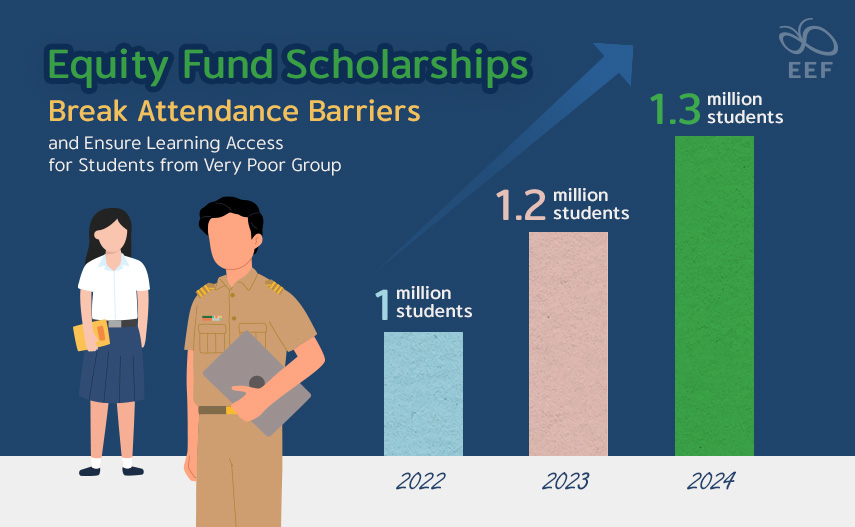
The Education Security initiative has made remarkable strides in enhancing educational access and retention rates for underprivileged and marginalized students through the Equity Fund Scholarship. From 2022 to 2024, the Scholarship’s reach expanded significantly, growing from 1 million to 1.3 million students or 30%. This expansion has been coupled with a steady improvement in overall retention rates, with in-school rates rising from 95.33% in 2022 to 95.95% in 2024 and dropout rates decreasing from 4.67% to 4.05%. Retention rates among students in transitional years have also steadily improved, with in-school rates climbing from 97.28% to 97.58% and dropout rates falling from 2.72% to 2.42%. Policy recommendations derived from the scholarship database suggest implementing progressive scale allocation rates from 3,480 Thai Baht per student per year in 2024 to 4,200 Thai Baht in 2026. Additionally, initiatives such as data sharing for the “Bring Children Back to School” project, support for internet SIM cards, and enhancements to lunch programs and information systems, collectively further strengthen the educational safety net across 28 districts, reaching 400,000 people nationwide.
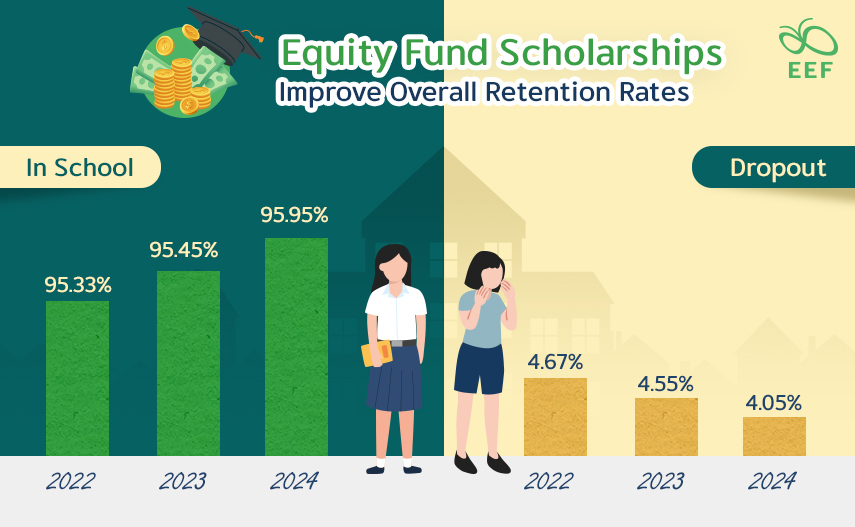
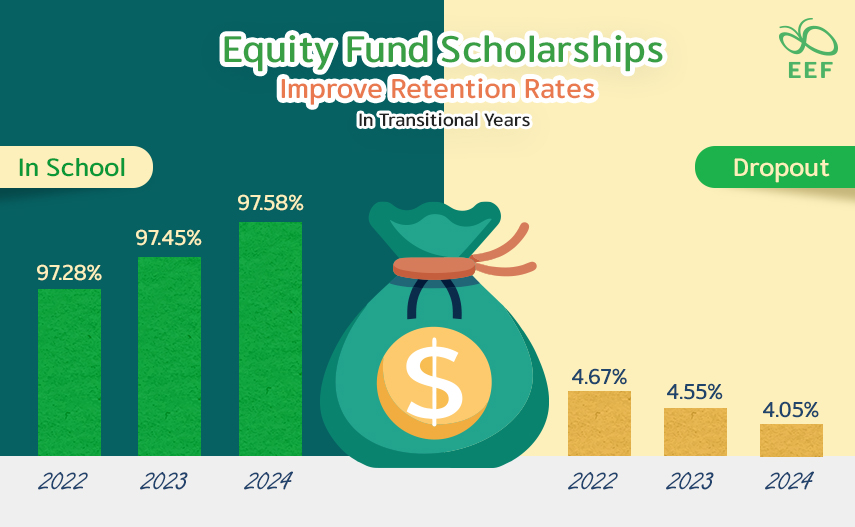
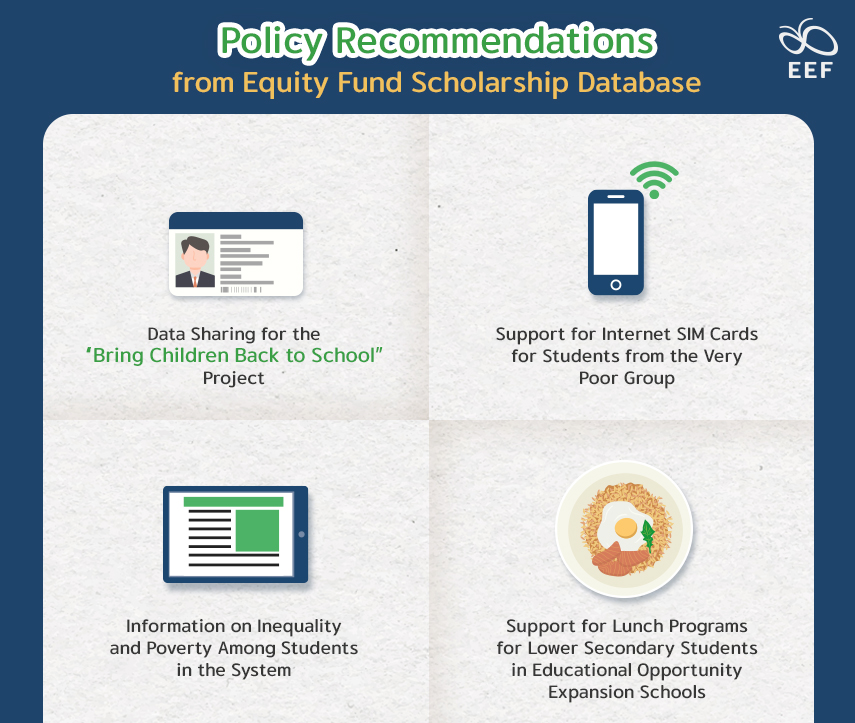
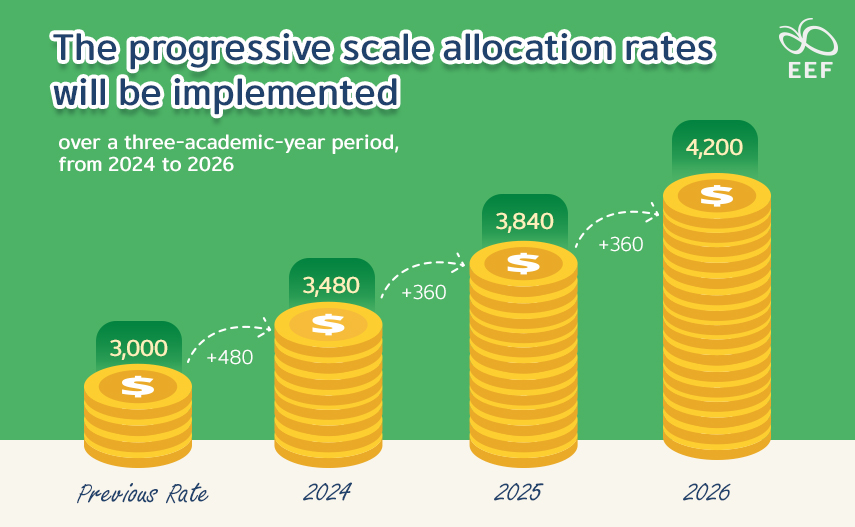
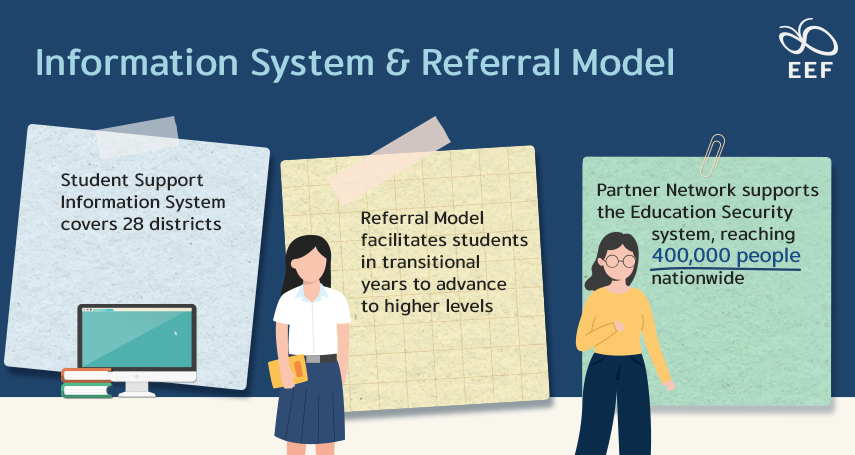
As Thailand advances its mission to eradicate educational inequality, the next horizon shines through with ambitious heightened commitment. On July 8th, 2024, the Thai government extended the deadline for Equity Fund Scholarship applications until August 1st, 2024, to allow schools to record data on at-risk students and provide timely support, thereby enhancing efforts in preventing student dropouts. This extension exemplifies Prime Minister Srettha Thavisin’s commitment to the ambitious Thailand Zero Dropout initiative, which integrates efforts from 11 key agencies to identify, support, and reintegrate out-of-school children and youth, addressing educational disparities that hinder Thailand’s sustainable economic development.

Recent data indicates that over 1 million children and youth aged 3–18 were missing from the educational system in 2023. A new agreement among these agencies will implement the “Thai Zero Dropout” application to coordinate nationwide efforts to ensure these students’ reintegration back into the educational system, starting in July 2024, with a kickoff in 25 provinces. Additionally, efforts are focused on preventing students from dropping out mid-year by supporting at-risk students from households with an average monthly income below 1,044 Thai Baht, or half the national poverty line. For the 2024 academic year, approximately 1.3 million students are expected to benefit.
In light of the Thai government’s heightened dedication, from July 8th and August 1st, 2024, the EEF allowed schools to record data on students at risk of dropping out through the Conditional Cash Transfer system. This endeavor was expected to support around 500,000 new at-risk students, ensuring that the total number of protected Equity Fund students reached approximately 1.3 million for the 2024 academic year. Meanwhile, from July 23rd to 26th, 2024, the EEF Thailand began distributing Equity Fund scholarships to over 800,000 students across six educational agencies, including the Ministry of Education (MOU), the Department of Local Administration (DLA), the Border Patrol Police (BPP), the National Office of Buddhism, the Office of Private Education Commission (OPEC), and the Bangkok Metropolitan Administration (BMA). This year marks the first increase in Equity Fund scholarship allocation rates, with primary and lower secondary students receiving up to 3,480 Thai Baht per student per year, up from 3,000 Thai Baht, to support breakfast costs and alleviate educational expenses for poor households. By 2026, this amount will rise to 4,200 Thai Baht per student per year.
Eligible students for the Equity Fund scholarships fall into four categories: students from low-income households currently in kindergarten to lower secondary education within participating schools; students previously failing screening who are eligible for re-evaluation; students receiving continuous funding for three years who must undergo re-screening in the first semester of 2024; and students transferring schools who must undergo re-screening by their new school as their previous funding does not carry over. Schools are encouraged to report any at-risk students who have not yet received assistance, allowing them to benefit from the EEF’s Equity Fund Scholarship. To date, the EEF has supported 1,200,161 students, with a notable 95.95% retention rate.
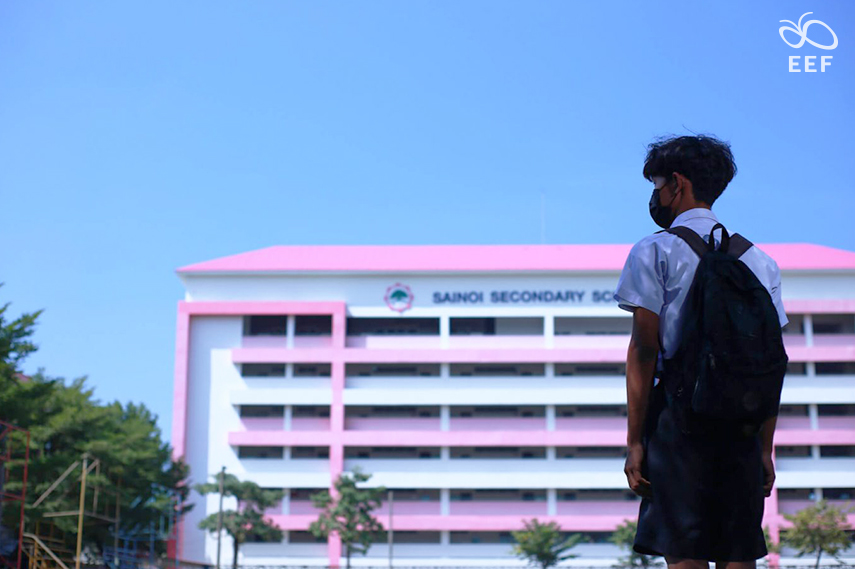
With its robust initiatives like the Education Security spearheaded by the Equity Fund Scholarship, the Equitable Education Fund (EEF) Thailand has significantly transformed the Thai educational landscape. By improving learning access, reducing dropout rates, and supporting at-risk students through targeted interventions and comprehensive data analysis, it not only addresses immediate educational challenges but also lays the groundwork for long-term systemic change. Corroborating this are the recent developments in the Equity Fund Scholarship, including the extension of application deadlines and the increased scholarship rates, which underscore a transformative moment for Thailand’s Education Security system. By supporting the reintegration of around 500,000 new at-risk students and distributing the Equity Fund scholarships to over 800,000 beneficiaries, the EEF has ensured that a total of 1.3 million students are protected for the 2024 academic year. This transformative shift to a proactive and progressive approach ensures that students from socio-economically disadvantaged backgrounds receive the support they need to thrive, setting a precedent for educational equity and resilience — and all of this begins with a simple yet seminal act of continuously visiting students’ homes, which sets off a powerful ripple effect.
As a result, the EEF has solidified its role as a pivotal partner in fostering an inclusive and dynamic educational environment, ultimately advancing Thailand’s broader educational goals. Its innovative strategies and comprehensive support systems make it an invaluable ally in the mission to ensure every student has the opportunity to succeed — embodying the EEF’s founding principle: to reduce education inequality through research, collaboration, and support for children, youth, and adults in need.

